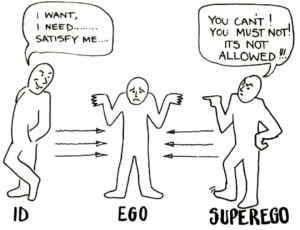PSYCHOLOGICAL DISORDERS
Enhancing Life. Excelling In Care.
Anxiety disorder, Depression, Obsessive-Compulsive Disorder, Addictions- tobacco, smoking, alcohol, etc., Social phobia, Specific phobia, Personality disorder, Schizophrenia, Sleeplessness, Unwanted thoughts, Post-traumatic stress disorder.
NO VISIBLE SYMPTOMS, NO RUNNY NOSE, JUST A HEAD FULL OF DARKNESS
NO FEVER OR RASH, NO FRACTURES OR SPRAINS, JUST LONGING FOR SOMETHING UNABLE TO EXPLAIN YESS!! THAT’S PSYCHIATRIC DISORDER.
Psychiatric disorders are a wide range of conditions that affects mood, thinking and behaviour and ultimately a life of the person. To understand what actually psychiatric disorder is, we need to understand the psychodynamics of psychiatric disorders.

The EGO tries to keep a harmonious balance between ID (our inner self, core, basic instincts), superego (rules and regulation), and outside reality. The EGO is under constant pressure to maintain this balance. It tries to manage this pressure by pushing it to the unconscious level, sometimes it pops up at the subconscious level in the form of dreams (dreams of missing trains, being lost, being chased by animals, running away, screaming but no one can hear, etc.).
When the pressure increases and the EGO becomes weak, it tends to produce anxiety. In Panic Anxiety Disorder, the constant pressure temporarily overpowers the EGO and produces panic attacks. Once this pressure releases itself through signs and symptoms, the EGO regains its control over the situation and the person returns to a normal state. So, this temporary weakening of the EGO tends to produce Panic Anxiety Disorder.
As psychopathology advances, the pressures from the forbidden inner drives weaken the EGO even further. Then there is a constant danger of the forbidden aggressive drives and fear of surfacing and being expressed in the outer world. This is the stage when Obsessive-Compulsive Disorder develops. There is a constant tug of war between the inner forces and the EGO.
The same thing happens in the cases of addictions, where a person wants to overcome their desire but can’t control the inner urge for a particular object whether it is alcohol, smoking, or drugs like weed, cocaine, LSD, etc.
When the inner force (ID) becomes so strong that the EGO breaks down, the individual develops psychosis or schizophrenia. In schizophrenia, there is a predominance of the unconscious forces over the conscious force.
HOMOEOPATHIC APPROACH IN PSYCHIATRY CASES:
Based on law of similia, we need to understand imbalance of EGO in that individual person through case taking. And give medicine accordingly.
Even in case of depression, post- traumatic stress disorders, anxiety disorders, phobias counselling will help the person along with homoeopathic medicine.
Even one can take psychiatric medicine along with homoeopathic medicine in severe cases of violence or suicidal impulses.
WITH INCREASE INVENTIONS OF GAMING DEVICES, SOCIAL MEDIA, VERTUAL REALITY AND DECREASE SOCIALIZATION, MENTAL DISORDERS ARE INCREASING DAY BY DAY, IN SUCH A CASE HOMOEOPATHY CAN GIVE PERMANENT SOLUTION WITHOUT ANY SEDATIVES AND SIDE EFFECTS.
Depression
Depression is a serious mental health condition that causes persistent feelings of sadness, hopelessness, and a lack of interest in activities. It can affect one’s thoughts, behavior, and physical health. Causes include genetics, brain chemistry, and life events. Treatment typically involves medication, therapy, and lifestyle changes. Seeking help is crucial for effective recovery..
- Symptoms: Persistent sadness, hopelessness, fatigue, changes in sleep and appetite, loss of interest in activities, and difficulty concentrating.
- Causes: Can be due to genetics, brain chemistry, hormones, or life events.
Sleeplessness
- Symptoms: Trouble falling asleep, waking up often during the night, waking up too early, feeling tired upon waking.
- Causes: Stress, anxiety, depression, poor sleep habits, medical conditions, medications, or stimulants like caffeine.
Improving sleep habits and addressing underlying issues can help alleviate sleeplessness.
Anxiety
- Symptoms: Excessive worry, restlessness, irritability, difficulty concentrating, muscle tension, rapid heartbeat, sweating.
- Causes: Can be due to genetics, brain chemistry, stress, or traumatic events.
- Types: Includes generalized anxiety disorder (GAD), panic disorder, social anxiety disorder, and specific phobias.
Hopelessness
Hopelessness is a state of despair and belief that things will not improve. It often accompanies depression and anxiety.
- Symptoms: Persistent negative thoughts, lack of motivation, feelings of worthlessness.
- Causes: Mental health disorders, chronic stress, traumatic events, repeated setbacks.
- Impact: Affects daily functioning, can lead to social withdrawal, substance abuse, and suicidal thoughts.
Seeking help from a mental health professional is crucial for managing and overcoming hopelessness.
Fear
Fear is a natural emotional response to a perceived threat or danger. It triggers the body’s fight-or-flight response, preparing an individual to either confront or flee from the threat.
- Symptoms: Rapid heartbeat, sweating, trembling, shortness of breath, panic.
- Causes: Real or imagined threats, past traumas.
- Types: Acute fear, chronic fear, phobias.
- Impact: Can cause avoidance behaviors and anxiety, affecting daily life.
Paralysis
Paralysis refers to the loss of muscle function in part of the body, often due to injury or illness affecting the nervous system.
- Causes: Spinal cord injury, stroke, traumatic brain injury, neurological diseases like multiple sclerosis or ALS.
- Types: Partial (paresis) or complete paralysis affecting limbs or entire body.
- Symptoms: Loss of sensation, muscle control, and voluntary movement in affected areas.
- Impact: Can affect mobility, independence, and daily activities.
Motor Neuron Disease (MND)
Motor Neuron Disease (MND) is a group of progressive neurological disorders that affect motor neurons, leading to muscle weakness, difficulty speaking, swallowing, and eventually paralysis. There is no cure, so treatment focuses on managing symptoms and providing supportive care to improve quality of life.
Cerebral palsy (CP)
Cerebral palsy (CP) is a group of lifelong disorders that affect movement, muscle tone, and coordination due to damage to the developing brain, usually before birth.
- Causes: Brain injury or abnormal development in the womb, during birth, or early infancy.
- Symptoms: Varied, including stiff or floppy muscles, involuntary movements, difficulty with balance and coordination, and speech impairments.
- Types: Spastic (stiff muscles), dyskinetic (uncontrollable movements), ataxic (poor coordination), and mixed types.
- Impact: Can affect mobility, fine motor skills, communication, and daily activities.
Convulsion
A convulsion is a sudden, uncontrolled contraction of muscles, which may cause a person to lose consciousness and shake uncontrollably.
- Causes: Can be due to epilepsy, febrile illness (fever), brain injury, stroke, or other neurological conditions.
- Symptoms: Involuntary muscle contractions, loss of consciousness, jerking movements, and sometimes loss of bladder or bowel control.
- Types: Generalized (affecting the whole body) or focal (affecting specific parts of the body).
- Impact: Can be alarming but usually subsides on its own. If recurrent, it may require medical evaluation and treatment.
Forgetfulness
Forgetfulness is difficulty remembering information or events, often caused by normal aging, stress, medical conditions, or medications. Managing it involves a healthy lifestyle, mental stimulation, and sometimes medical evaluation.
- Symptoms: Forgetting names or appointments, misplacing items, difficulty recalling recent events or information.
- Impact: Mild forgetfulness is common, but severe or persistent memory problems may affect daily functioning and quality of life.
Obsessive-Compulsive Disorder (OCD)
- Symptoms:
- Obsessions: Unwanted, intrusive thoughts, urges, or images that cause distress.
- Compulsions: Repetitive behaviors or mental acts performed to alleviate the distress caused by obsessions.
- Impact: Can interfere with daily activities, relationships, and work.
- Causes: Genetic, neurological, and environmental factors may contribute.
Attention-Deficit/Hyperactivity Disorder (ADHD)
ADHD (Attention-Deficit/Hyperactivity Disorder) is a neurodevelopmental disorder characterized by difficulties in focusing, controlling impulses, and managing hyperactive behaviors. Treatment typically involves therapy, medication, and support to improve attention and overall functioning.
Bad habits
Bad habits are behaviors that are detrimental to one’s physical health, mental well-being, or overall productivity. These habits often persist despite negative consequences.
- Examples: Smoking, excessive screen time, nail-biting, procrastination, overeating, and negative self-talk.
- Causes: Can stem from stress, boredom, learned behaviors, or psychological factors.
- Impact: Negatively affects health, relationships, work, and personal development.

